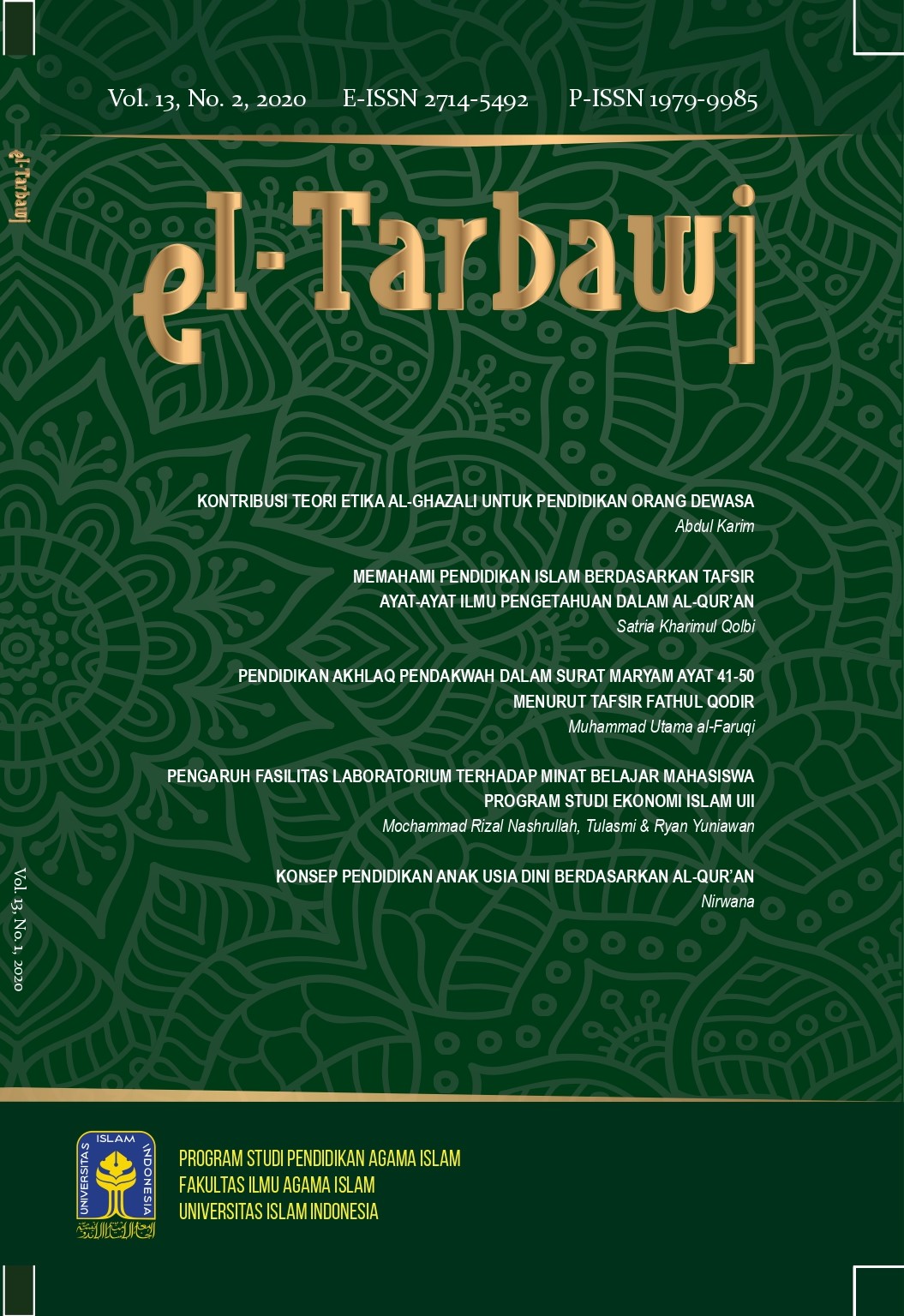Main Article Content
Abstract
Early childhood education is an important stage to be prepared carefully and conceptually. The verses in the Koran can be used as a guide in providing the values of early childhood education in an Islamic way to face modern life today. This study aims to discuss early childhood education in the Koran, stages of early childhood education in the Koran, Surah Luqman, and the concept of early childhood education in the Koran, Surah Lukman. This research uses the literature study method. This study found that early childhood education has beneficial roles in life. This study also found seven stages of educating early childhood and six concepts of early childhood education in the Koran, Surat Luqman. A researcher hopes that this research can be useful for future research in the field of early childhood education from an Islamic perspective.
Keywords
Article Details
Copyright (c) 2021 EL TARBAWI

This work is licensed under a Creative Commons Attribution-ShareAlike 4.0 International License.
Authors retain copyright and grant the journal right of first publication with the work simultaneously licensed under a Creative Commons Attribution (CC-BY-SA) 4.0 License that allows others to share the work with an acknowledgment of the work’s authorship and initial publication in this journal.
References
- Mukhid, Abd. (2016). Konsep Pendidikan Karakter Dalam Al-Qur’an. NUANSA: Jurnal Penelitian Ilmu Sosial dan Keagamaan Islam, Vol. 13 (2) 309-328.
- Jalaluddin. (2003). Teologi Pendidikan. Jakarta: PT. Raja Grapindo Persada.
- Mukhlis, G.N. (2017). Pendidikan karakter untuk anak usia dini menurut QS Lukman: 13–19. PEDAGOGI: Jurnal Anak Usia Dini Dan Pendidikan Anak Usia Dini, 3(3a).
- Mustoifah, dkk. (2018). Teori dan Aplikasi dalam Penafsiran Ayat Pendidikan. Yogyakarta: Diandra Kreatif.
- Nata, Abuddin. (2016). Pendidikan dalam Perspektif Alquran. Jakarta: Prenada Media Group.
- Nazir, Moh. (2013). Metode Penelitian. Bogor: Ghalia Indonesia.
- Pranata, S. and Sadewo, F.S. (2012). Kejadian keguguran, kehamilan tidak direncanakan dan pengguguran di Indonesia. Buletin Penelitian Sistem Kesehatan, 15(2), p.21342.
- Shihab, M. Quraish. (Tanpa Tahun). Mahkota Tuntunan Ilahi. Jakarta: Untagama.
- Teja, M. (2014). Perlindungan terhadap anak terlantar di panti asuhan. Info Singkat Kesejahteraan Sosial, 6.
- Tim Penerbit Ma’sum. (2017). Al-Qur’an Terjemah Ma’sum. Surakarta: Ma’sum.
References
Mukhid, Abd. (2016). Konsep Pendidikan Karakter Dalam Al-Qur’an. NUANSA: Jurnal Penelitian Ilmu Sosial dan Keagamaan Islam, Vol. 13 (2) 309-328.
Jalaluddin. (2003). Teologi Pendidikan. Jakarta: PT. Raja Grapindo Persada.
Mukhlis, G.N. (2017). Pendidikan karakter untuk anak usia dini menurut QS Lukman: 13–19. PEDAGOGI: Jurnal Anak Usia Dini Dan Pendidikan Anak Usia Dini, 3(3a).
Mustoifah, dkk. (2018). Teori dan Aplikasi dalam Penafsiran Ayat Pendidikan. Yogyakarta: Diandra Kreatif.
Nata, Abuddin. (2016). Pendidikan dalam Perspektif Alquran. Jakarta: Prenada Media Group.
Nazir, Moh. (2013). Metode Penelitian. Bogor: Ghalia Indonesia.
Pranata, S. and Sadewo, F.S. (2012). Kejadian keguguran, kehamilan tidak direncanakan dan pengguguran di Indonesia. Buletin Penelitian Sistem Kesehatan, 15(2), p.21342.
Shihab, M. Quraish. (Tanpa Tahun). Mahkota Tuntunan Ilahi. Jakarta: Untagama.
Teja, M. (2014). Perlindungan terhadap anak terlantar di panti asuhan. Info Singkat Kesejahteraan Sosial, 6.
Tim Penerbit Ma’sum. (2017). Al-Qur’an Terjemah Ma’sum. Surakarta: Ma’sum.
